Foraging Trolls, Pickshaming and Social Media
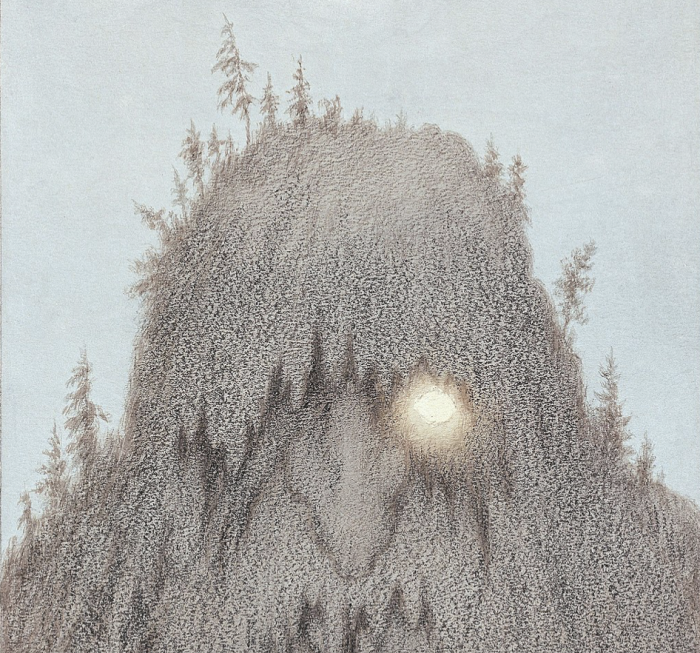
Image: Wiki Commons, Skogtroll (Forest Troll), by Theodor Kittelsen, 1906
Trolling – Slang – Intentionally trying to instigate conflict, hostility, or arguments in an online social community
Discussion, disagreement, debate and criticism are core parts of the modern social media phenomenon, and that includes the foraging scene. Anyone who has shared posts about their foraging activity on the internet is likely to have been challenged about their foraging behaviour at some point.
I have no problem with that: as I discussed in my post exploring the wider context of Foraging and Social Media, social media posts are generally inadequate for exploring the nuances of foraging, so its not unreasonable to expect questions, queries and polite criticism. Any forager worth their salt will make time to respond politely and informatively. I’m certainly not suggesting that anyone who challenges a forager, or foraging behaviours is a troll.
Unfortunately social media excels at subduing much of the etiquette, manners and nuance that come with face-to-face communication. People who wouldn’t say boo to a goose in the real world suddenly feel empowered to pile in with arguments, language and criticism that they would be highly unlikely to deploy in person.
The person on the receiving end of such behaviour feels under attack and can easily over-react. Before you know it, there’s a battle going on, both sides becoming ever more entrenched, and consuming lots of nervous energy.
This is an all too familiar story across most social media platforms. From my experience (which is mostly limited to Twitter/X, Facebook and Instagram) its most prevalent on Facebook, but I’ve seen some pretty grim threads unfold on UTube too.
What I find particularly tragic about this is that a large proportion of these conflicts are between people who have loads in common.
In the foraging scene, the attacks come most often from people who see themselves as “protectors of nature”, and foragers as a threat to nature. I’ve discussed the misguidedness of these attacks at length elsewhere on this website so I won’t go over it again here. My point is that both sides generally love, respect and wish to support and restore human connections to the natural world, but are going about it in different ways. The tragedy is that as they bicker about whether its ethical to harvest, say, a few rowan buds, another thousand square kilometres of green space vanishes.
Social media is designed to distract by stupefication and/or conflict. Its all too easy to spend precious energy bickering with folk with whom we share a massive chunk of our world view, rather than the tackling the true threats to that world view: squabbling with allies while the world burns. Its so dispiriting to see, and worse to get sucked into.
A Spotter’s Guide To Foraging Trolls
For a bit of light relief after one such encounter (detailed below), searching for a positive response to a lot of negative energy, I felt moved to vent my frustrations by making “A Spotter’s Guide to Foraging Trolls”. My motivations were to point out some of the issues around forage-trolling in a way in which embattled foragers can have a bit of fun. Some fellow foraging teachers and I are going to be playing Foraging Troll Bingo based on it.
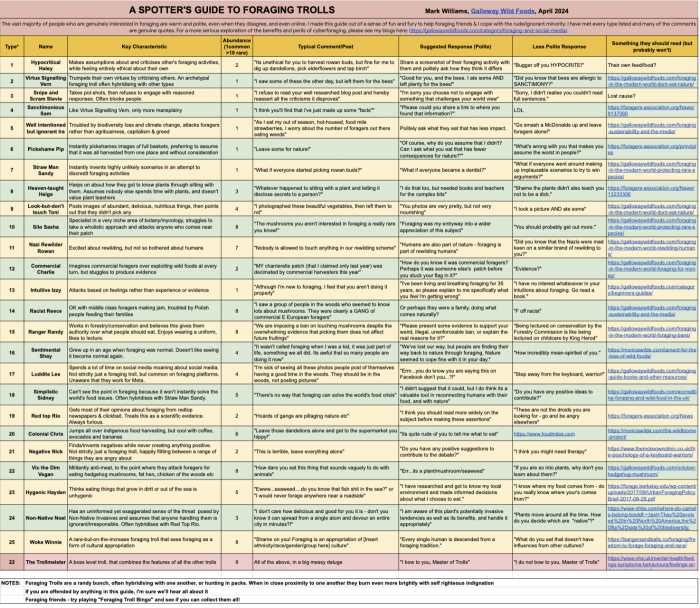
A Spotter’s Guide to Foraging Trolls. You can view a zoomable PDF of the guide here: Spotter’s Guide to Foraging Trolls – Sheet1 Or view it on Google Sheets here.
You might think i’m being unkind labelling so many types of foraging nay-sayers as trolls. The general definition of an internet troll infers that they are attacking purely out of malice. But as I discussed above, foraging trolls are different, often believing quite passionately in what they are saying. This adds a flavour of self-righteous indignation to their comments that makes them even harder work.
There are some key characteristics that, in my book, differentiate foraging trolls from folk expressing a perfectly reasonable questions or issues:
- Rude/Impolite. You don’t have to swear to be rude – calling someone “unethical” when you don’t know them and haven’t read the information they have shared is rude.
- Makes unreasonable assumptions. Foraging trolls choose to assume the worst, and choose not to find out more before declaiming their views. Classically, they will not read links to further information, preferring to make up an imagined narrative based on a photo and/or whatever’s on their agenda.
- Ignores rational argument. As threads develop, trolls do not engage with alternative views, answers to their questions or further reading.
- Remakes the same point repeatedly and never revises their views
- They jump on other people’s comment feeds. Rather than posting about the issue that is on their mind on their own feed, they pile into someone else’s. (I am aware that this whole article might be framed as me “trolling the trolls”. Perhaps I am, but I think a clear differentiating factor is that I’m not imposing this onto anyone else’s pages or posts!)
I should also say that trolling isn’t one-way traffic in the foraging sphere. I’ve seen some pretty poor online behaviour by foragers, such as trolling mushroom identification groups that have a firm “we don’t discuss edibility on this forum” policy, or being rude and aggressive when politely challenged about their harvesting strategies. Such cases are equally unpleasant and should be called out for what they are.
I’ve added a case study of a trolling incident on my Facebook Page at the end of this blog to illustrate some of these behaviours.
Foraging and Pickshaming
Pickshaming – Noun – The act of publicly criticising and drawing attention to someone for their foraging activity, especially on the internet
Most foraging trolling incidents include some form of pickshaming, as demonstrated in the example below. But while it most commonly happens online, it can also occur in the real world. A sort-of friend of mine occasionally subtly (and I suspect unknowingly) pickshames me by saying things like “Golly, what a lot of mushrooms”. I don’t think i’m being oversensitive in finding his tone a bit judgy! (We have history, its OK!)
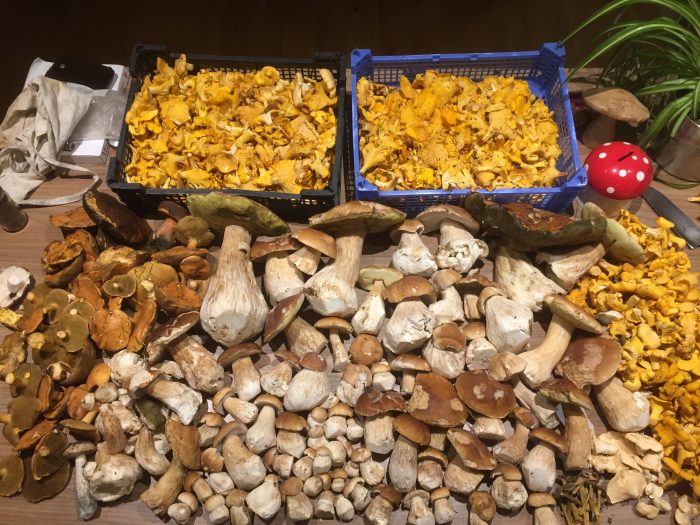
This may look like an excessive amount of mushrooms to some people, but if they took the time to hear what I have to say and ask questions, they’ll find they are the result of 35 years of hard work and observation! Read more about this here.
Like trolling, pickshaming is almost always based on a lot of assumptions.
It is a bit of a cliché, but that doesn’t mean it isn’t accurate:
when you assume you make an ass out of u and me. (But mostly U!)
I may very well have what looks like a lot of mushrooms, especially to someone who hasn’t spent 35 years of their life learning their habits and locations. If my friend chose to ask, I’d tell them about the thousands of mushroom-less miles I’ve put in down the years, how today’s bumper harvest came from 6 different locations that I’ve been carefully tending for the last 15 years, how I left most to continue dropping spores, or for anyone else who takes the trouble to find them.. But its easier for them to assume I’ve just gone out and – by some dint of extreme fortune – come across the motherlode and grabbed every single one.
Pickshaming is, of course, worse online. I find it quite shocking how quickly someone will attack someone else’s food choices.
I would never dream of diving in and criticising someone else’s food choices, but, if they challenge my foraging, I feel entirely justified in politely asking what they eat that has less impact than my wild harvests? They usually pipe down at this.
As I discussed in my post on Foraging and Social Media, I don’t think its at all unreasonable to politely ask foragers about their harvesting strategies, but non-aggressive open questions like “Would you mind sharing some strategies for harvesting sea beet so it provides a steady harvest?”, or “What’s a reasonable size to pick hedgehog mushrooms at?” are the best ways to open such conversations.
Foraging and Virtue Signalling
Virtue Signalling – noun -the public expression of opinions or sentiments intended to demonstrate one’s good character or social conscience or the moral correctness of one’s position on a particular issue.
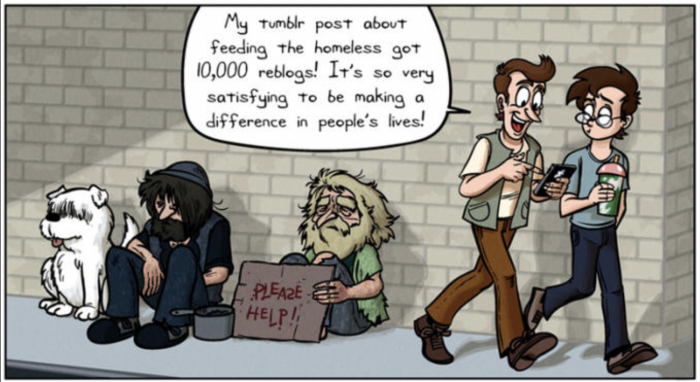
Virtue signalling combines some of the worst aspects of foraging trolling and pickshaming, and adds a twist of its own. It often involves saying what you hate (teenagers have done this about music for generations), which may be entirely genuine, if a little negative.
Accusing someone of virtue signalling has become something of an overused put-down for anyone you disagree with, but I fear that the foraging scene genuinely suffers from an especially pernicious and nauseatingly sanctimonious version. Some foraging posts, and occasionally whole feeds consist entirely of virtue signalling, but they are quite easy to recognise and avoid. More common is the virtue signalling snipe on a comment thread, the classic being:
“I saw some of these the other day, but left them for the bees/to drop their spores”
I find this the worst form of foraging trolling as it immediately tries to grab the moral high ground, while at the same time making all sorts of assumptions about what the forager has or hasn’t done. Its also an appealing message to the non-foraging and non-nature literate (“look at the nasty forager stealing the poor bee’s food!”) and very time consuming to unpick and set straight.
Apart from their sickly sanctimony, such comments show a fundamental ignorance about the fecundity of plants or fungi. Bees are under pressure due to habitat loss, neonicitinoids and climate change, not competition from foragers! In fact foraging is one of the best ways fight back against these issues. And I’ve unpicked the fungi debate a thousand times before (see here, here and here for starters).
As I note on my Spotter’s Guide to Foraging Trolls, the politest brief response I can muster for a Virtue Signalling Vern is usually something like “Good for you, and the bees. I ate some AND left plenty for the bees!”.
What I really want to say is “Did you know that bees are allergic to SANCTIMONY?!”
Don’t Despair!
I’ve focussed on quite a lot of negative stuff here, and I’m sorry for that. I needed to say it, but am also uncomfortable drawing attention to the negative minority when foraging is such a positive force for good in the world.
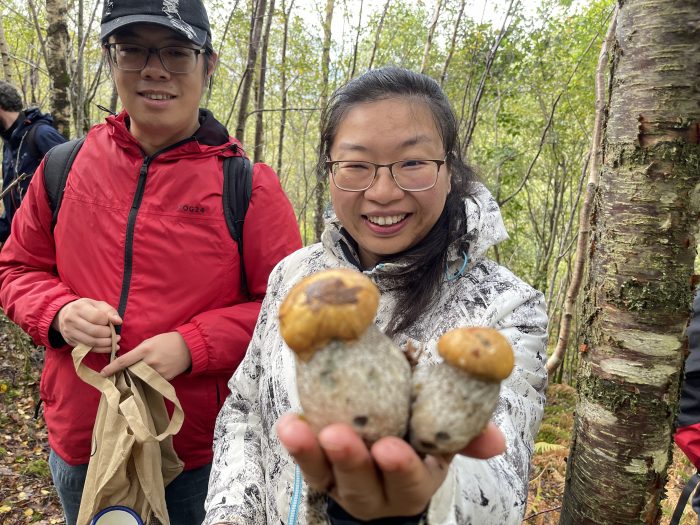
In truth the vast majority of comments on well considered foraging social media posts are positive. Even the less positive comments are usually polite and take an interest in constructive discussion. Its just that we tend to fixate on the horrid ones!
Humans have an innate negativity bias – our tendency not only to register negative stimuli more readily but also to dwell on these events. This means that we feel the sting of a rebuke more powerfully than the joy of praise. Its entirely natural, still with us from our hunter-gatherer past when negative threats in the world were matters of life and death.
Negativity bias is particularly prevalent when we look at social media comments: a hundred warm and pleasant posts are easily overwhelmed by one negative one.
But the vast majority of comments on well considered foraging social media posts are positive, and most of the few that aren’t are made politely and with an interest in constructive discussion.
In 15 years of posting on social media, I have noticed a downward trend in the amount of foraging trolls I encounter. This may be because I’ve tailored my online behaviour to avoid them – life is too short for feeding trolls! – and perhaps because people are learning how to interact with more civility on line. But I’d also like to think that foragers may have affected something of a culture change by patiently listening to genuine concerns and responding thoughtfully and politely when challenged.
Its also worth remembering that the folk who comment on social media posts most vociferously tend to be either strongly for or, more likely, strongly against the issue raised. These are a tiny proportion of the folk who actually see and digest the topic/post/debate. The vast and quiet majority are thoughtful, considered, and more open to persuasion. So by remaining polite, reasonable and evidenced in the face of rude and ranty nonsense (from people who have zero interest in changing their view anyway), cyberforagers can influence the silent majority, and spread good news, good practice and good manners around foraging.
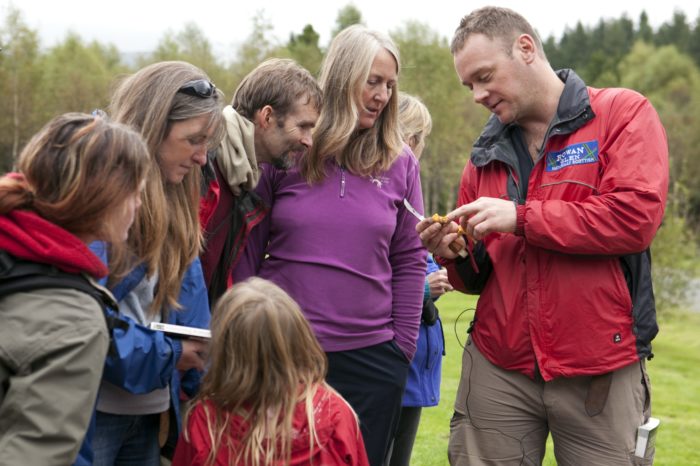
Forage Trolling – A Case Study
To illustrate some of the challenges and frustrations around forage trolling, here is a genuine post I made on my social media, and the attack it came under. I’m not trying to shame anyone here, or raise a Facebook mob, so I’ve changed the name and recreated it here, rather than linking direct to the original. I’ve also closed comments on the thread. Please don’t go troll hunting!
“Don’t feed the trolls” is a pretty good maxim for online life, and I’m generally quite good at sticking to it. But as we’ve explored above, the self-righteousness of some trolls, as well as a hope on my part that I may be able allay their fears, or a least influence more reasonable readers, means I do get sucked in occasionally.
Every comment I’ve reproduced below is as posted, though the troll started two threads so the timelines are possibly a bit out of sync. The troll, who I have labelled FT, happened to be female here. I’m not trying to suggest that all foraging trolls are female (I went to some length to find gender neutral names for my spotter’s guide!), but the wooly, sanctimonious tone in this example is more typical for female foraging trolls in my experience.
I think it speaks for itself, but I’ve added some commentary to draw out some wider points and the different types of Foraging Troll types she morphs through – you can follow them on my spotter’s guide!
This is a very gentle example, quite polite, but draining in its sustained pious pontification on “ethical foraging” and refusal to respond to reasoning. I’ve had much worse.
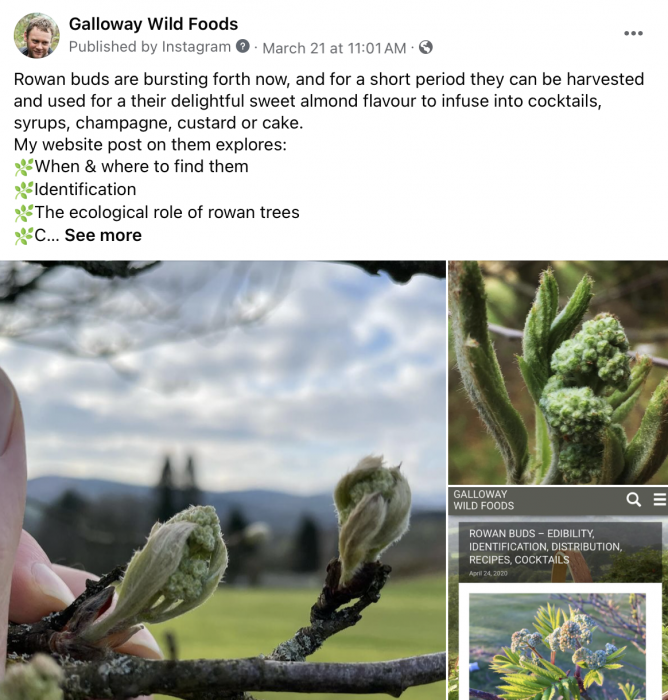
My original post:
MW: Rowan buds are bursting forth now, and for a short period they can be harvested and used for a their delightful sweet almond flavour to infuse into cocktails, syrups, champagne, custard or cake.
My website post on them explores:
🌿When & where to find them
🌿Identification
🌿The ecological role of rowan trees
🌿Considerate harvesting
🌿Other plants with sweet or bitter almond flavours that grow wild in the UK
🌿Safety considerations and safe preparation of almond-flavoured buds
🌿How to use them in the kitchen
🌿Rowan bud syrup recipe
🌿Rowan bud liqueur recipe
🍹2 rowan bud cocktail recipes
Link in my bio, or here: https://gallowaywildfoods.com/rowan-buds-edibility…/
Or join me on one of my guided walks to experience them first-hand – new events booking now.
Over about 15 years of posting about foraging on social media, I have learned to post a link to clear information as often as possible. It saves me from re-answering questions I’ve already addressed hundreds of times. Note that it includes information on the wider ecology of rowans, and thought on considerate harvesting. People who want a fight tend not to bother reading these things…
FT: Personally I find this unethical foraging
Sorry but not the first buds
Kind of polite, using “personally” and “sorry” while at the same time piling in and calling me “unethical”, which I take pretty seriously. I wonder whether she would say that to someone in person? Its not trolling yet, but there is a distinct waft of it. I take a deep breath, grit my teeth and give my polite reply:
MW: I understand and appreciate your concern, but to harvest a small amount from the tiny proportion of buds that are within reach from a very common tree seems to me to be more ethical and have less impact on the natural world than, say buying imported almonds. Also, these trees were on a golf course, and the lower branches are regularly pruned.
If you’d like to explore more about the impact of “eating nature “, there’s info here: https://gallowaywildfoods.com/foraging-in-the-modern…/FT: If everyone takes a small amount from one tree that’s a lot of buds
Trolls often fire off multiple comment strands without waiting for a response, or just completely ignoring what has gone before. This one is a classic “straw man” argument, I’ve seen it thousands of times and its always ridiculous. What if everyone started juggling tomorrow? See Spotter’s Guide to Foraging Trolls Type 7: Straw Man Sandy. I’m staying patient because I think she might be hybridised with Type 5: Well Intentioned but Ignorant Ira. Occasionally Type 5’s can take in new information and revise…
MW: That is a straw man argument! I’ve been tending it for over 10 years and nobody else visits that tree other than greenkeepers with loppers!. Even if they did, they can only reach about 1% of its buds.
I intended to include a link to what a Straw Man Argument is here, but pressed send too soon.
FT:[Replying to my earlier comment, but seemingly not having read it…] It’s the trees first sign of life ,nothing to do with Almonds the subject here Is Rowan not Almonds
FT: it’s all good I’ll leave the buds on trees its gifts for us will be fruit
Respect to all
So Type 2: Virtue Signaling Vern rears her head now too. I resent the implication that I don’t respect the tree, and am slightly baffled/amused at why she’s cool with picking the fruit but not the buds, but hey-ho, I’ve got better stuff to do. Oh, wait, she has more…
FT [Again]: our ancestors knew to leave the buds so they can flower and Bear fruit if it’s your tree fair enough ,and the Rowan is very sacred
Type 4 Sanctimonious Sam rears her head, with hints of Type 13 Intuitive Izzy. I’m getting annoyed now, so have a quick look at her FB Profile. Crikey, she’s been sharing about the joys of twig tapping birch trees…Type 1 Hypocritical Hayley. We got us a mega hybrid on our hands!
MW: Yet you are happy to chop birch branches (with screenshot of her post)
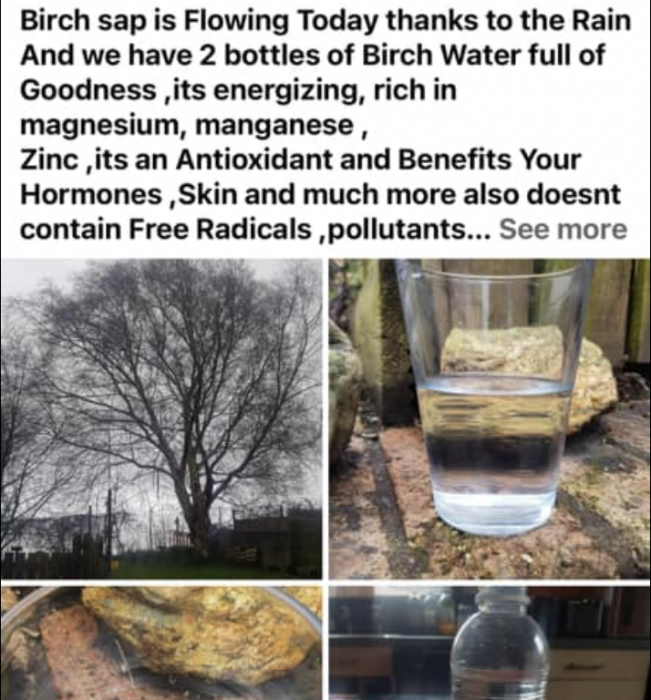
Regrettably, the self same lady who was so against me picking rowan buds couldn’t explain how her cutting birch twigs differed….
At this stage FT abandons this thread. Funny that – Type 3 Snipe & Scram Sandy.
But at he same time she’s been having a go on a different (but all too familiar) thread below the same post…
FT: Why would you take the trees first growth in Springtime let it at least flower and bear fruit. It’s a shame theres so much other things to forage from
MW: see my reply to your first comment above ⬆️ .[I’m getting confused by the multiple threads at this point]
Are you suggesting then that we don’t eat other hyperabundant wild foods like nettles, ground elder, dock, sorrel, dandelions, spruce tips, wild garlic etc etc in early spring? If so, what do you suggest as an alternative that has less impact than considerately harvesting super-abundant, local foods?
I don’t think its about what we harvest, or when, but how sensitively and considerately we do it. You can read more about this in my website here: https://gallowaywildfoods.com/conservation/
I’m kinda struggling, but just about remaining patient. But it seems this is very particular to rowan…
FT: no I did not suggest that you dont forage abundant wild foods you just said that , its Rowan you posted not Nettle ,I do suggest you pick as much abundant wild foods as u like I do ,its Rowan Buds you posted ,and Rowan buds I’m talking about ,if you tell people to forage a trees buds the tree cant flower and fruit you know fine well what I meant it’s not Ethical to the Tree ,pick the buds it will not bear fruit, you know Nettle ,wild garlic ,nettle and Dandilion cleaver the more you pick the more it grows back quickly and multiply, trees are different trees need there buds it’s the first process of it coming back to life ,Rowan Trees are not as abundant ,at least wait till the berries if you need to ,its about balance and protecting the Tree ,you wouldnt want a Tree to be half badly because everyones out picking its buds
Theres Ethical Foraging ,theres plenty of wild foods out there ,its common sense ,its the same said you pick a lot of Blossoms from a tree it wont fruit ,the tree has a cycle I say this is the nicest way ,some believe the Rowan is Protected by Nature ,its an auspicious Tree too
I’ve seen folk strip trees of bark theres a time to take from Trees and it’s one thing I always ask the Tree itself ,people dont have patience to wait and let the Tree do its thing that’s my point ,maybe it’s just me I wouldnt take the trees first growth you do you
Sheesh…I have to work hard not to be snobbish about the general poor grammar, random capitalisations, incorrect spellings, etc but its helpfully eclipsed by her odd fixation on rowan, lecturing tone, and massive assumptions about how I relate to rowan trees. Perhaps Type 10 Silo Sasha (only without the science) and definitely Type 6 Pickshame Pip. Oh…she’s off again…
FT: Picking whole Blossoms or Buds from Rowan means it wont bear fruit ,that’s ok if 1 person picks a few ,if a lot of people do that then they tree doesnt get to bear anything that’s what I mean ,let the Tree grow its buds and have its life cycle Respect
MW:You seem to be projecting a lot of negative assumptions about how I relate to this rowan tree! I’ve been respectfully tending it for over 10 years, we get on fine, and they are extremely common around my area. I repeat (though you don’t seem to want to hear it) that i can only reach about 1% of its buds, and still leave plenty of those that I can reach.
The net effect of taking a few buds is comparable to taking a few leaves and shoots from other plants, so i’m not sure why you are fixated on rowan?
All we eat has an impact on nature, foraged food has less than the alternatives, which is why I compare the impact of using rowan buds v the impact of using cultivated imported almonds. I shared a thoughtful article that explores this, please read it before more ranting and straw man arguments!
This is a defining feature most Foraging Trolls: they make a lot of negative assumptions about the person they are attacking, and stick to them no matter what.
At this stage some sensible people joined the thread, re-making the point about the minute quantities involved, how rowans respond to pruning, gentle jokes about carrying ladders around. I’m pleased to report that they all remained polite and civil, despite their incredulity. I can never bear rudeness, even if it is on my side!
Anyway, it was around this point that I saw her posts on her own feed – the one about birch tapping, but also some more on digging up dandelions and picking elderflowers, which she’s right into…
MW: I’m genuinely curious how you think picking some buds from rowan differs from, for example, cutting branches from birch trees in spring to harvest their sap, which I see you promote on your fb? (Please note that I am not criticising your food choices, or making assumptions about your relationship with birch trees, as you have done regarding my relationship with rowan. I’m only curious why and how you think your actions are different?)
I really, really wish I had gone straight on her profile and sent this.
That was the last I heard from her. While this was mostly a good thing, it was also quite infuriating that when confronted with her own hypocrisy she couldn’t own it. That’s the second defining feature of true foraging trolls: they never change their mind or apologise, no matter how patiently you present them with evidence.
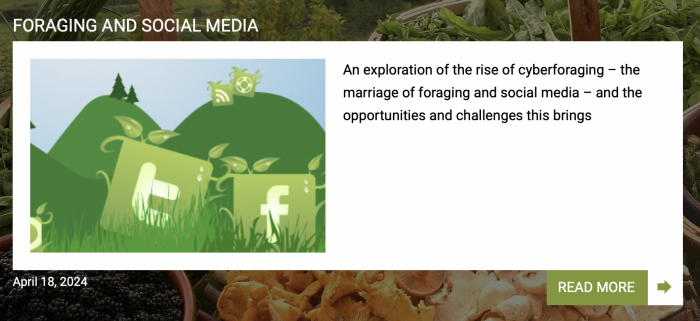
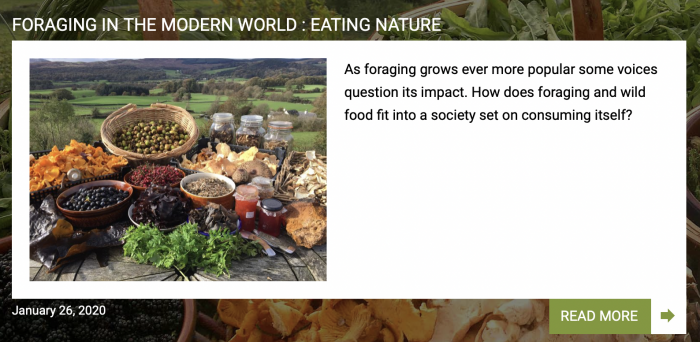
2 Comments
I’m wondering what would happen if more and more people foraged for wild food in UK. At what point would it become unsustainable? We have 69 million population in UK. What level of foraging can the countryside sustain before it negatively impacts wildlife? This is a genuine question.
Hi Liz,
It isn’t possible to answer that question exactly, but its not so much about numbers as (a) good practice, and (b) land use – how much land is available for foraging. Might we ask at what point farming started to impact wildlife? I’d suggest that foraging has, and will continue to have considerably less impact at much higher numbers. If you’d like to explore this more, I address your question directly in this blog: “Foraging in the Modern World: Protecting Rare Species” . If you’d like to read more widely on the subject there is a whole series of articles on what I loosely term “The Politics of Foraging” here: Foragin Politics . Do please come back with any questions when you have read and considered.
Mark.